September 9, 2025
2025 Momentum at Work Report
How maintenance work and silos impact today's organizations
Today's knowledge work is slow and siloed, with momentum blockers at every turn. We surveyed 6,100 knowledge workers globally to gain insight into how maintenance tasks and organizational silos impact their roles and daily lives. By better understanding what's slowing them down and identifying how AI can help, we can shine a light on a path forward to a better future — where teams are empowered to build the next big thing, faster.
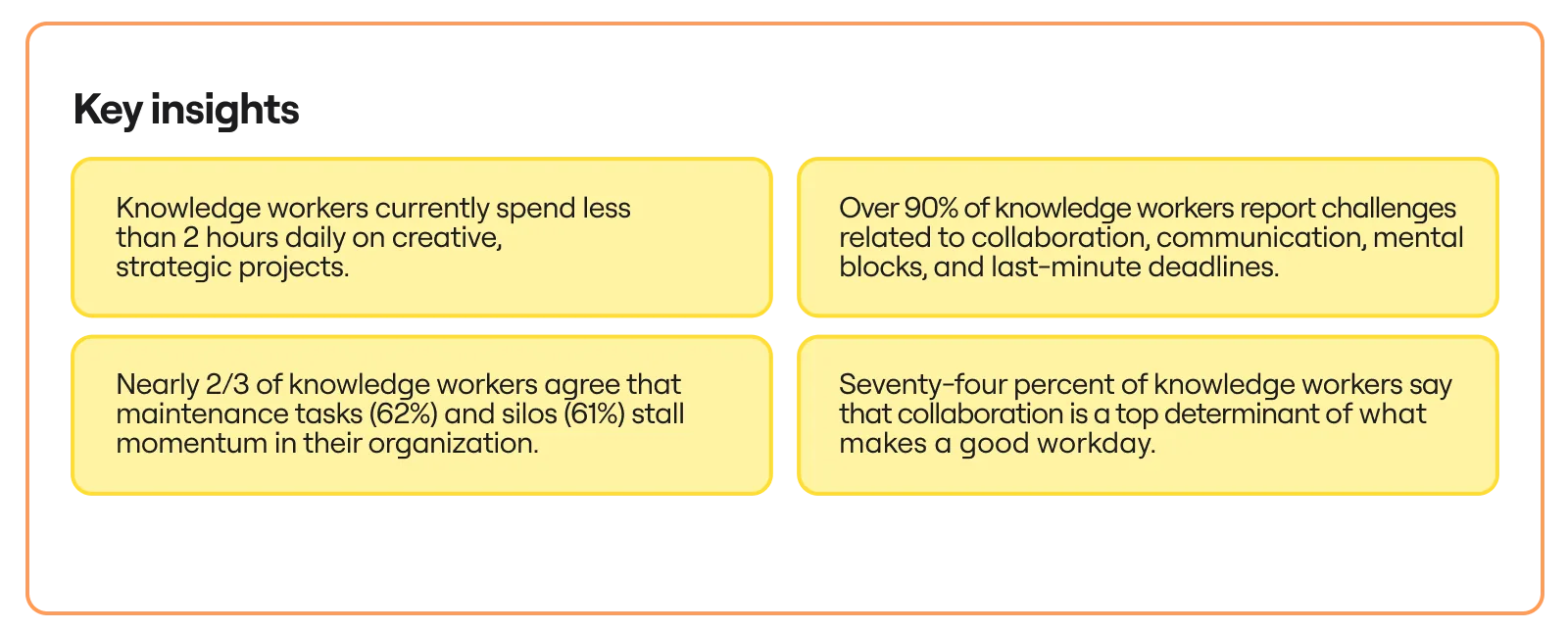
The momentum vs. maintenance imbalance
Knowledge workers' tasks fall into two categories: momentum and maintenance:
- Momentum work is creative, strategic, and drives innovation. Think: deep brainstorms, collaborative workshops, and iterative cross-functional projects.
- Maintenance work consists of the more repetitive tasks that support day-to-day operations. It includes managing emails and messages, administrative chores, and meetings.
For every 1 hour of momentum work, workers spend 3 hours on maintenance tasks like meetings, email, and paperwork.
For teams to thrive, maintenance and momentum must be in equilibrium. But when maintenance work takes over, momentum stalls.
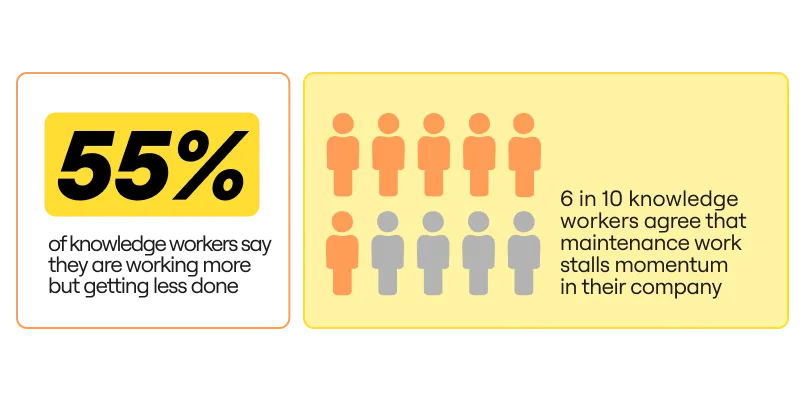
Outdated, fragmented tools contribute to maintenance work
These are the most common types of maintenance work, according to global knowledge workers:
- Communication chaos: Constant emails and messages (79%)
- Continuous re-creation: Redoing work in different tools/apps (57%)
- Tedious taskwork: Endless reporting and updates (55%)
What's behind the rising tide of these chores? Knowledge workers cite tooling as one of the primary drivers, pointing to outdated tools (58%) and fragmented tech stacks (43%). Meanwhile, 39% say that a failure to fully leverage AI exacerbates maintenance work.
39% of knowledge workers agree that failing to embrace AI leads to more maintenance work
Task overload leaves teams distracted and drained
Juggling so much maintenance work makes knowledge workers feel unfocused and exhausted. Sixty-one percent say that it distracts them from their core responsibilities, and 62% report that it slows them down and reduces their productivity. Over half (52%) agree that maintenance work is a source of stress, and 62% feel drained due to task buildup.
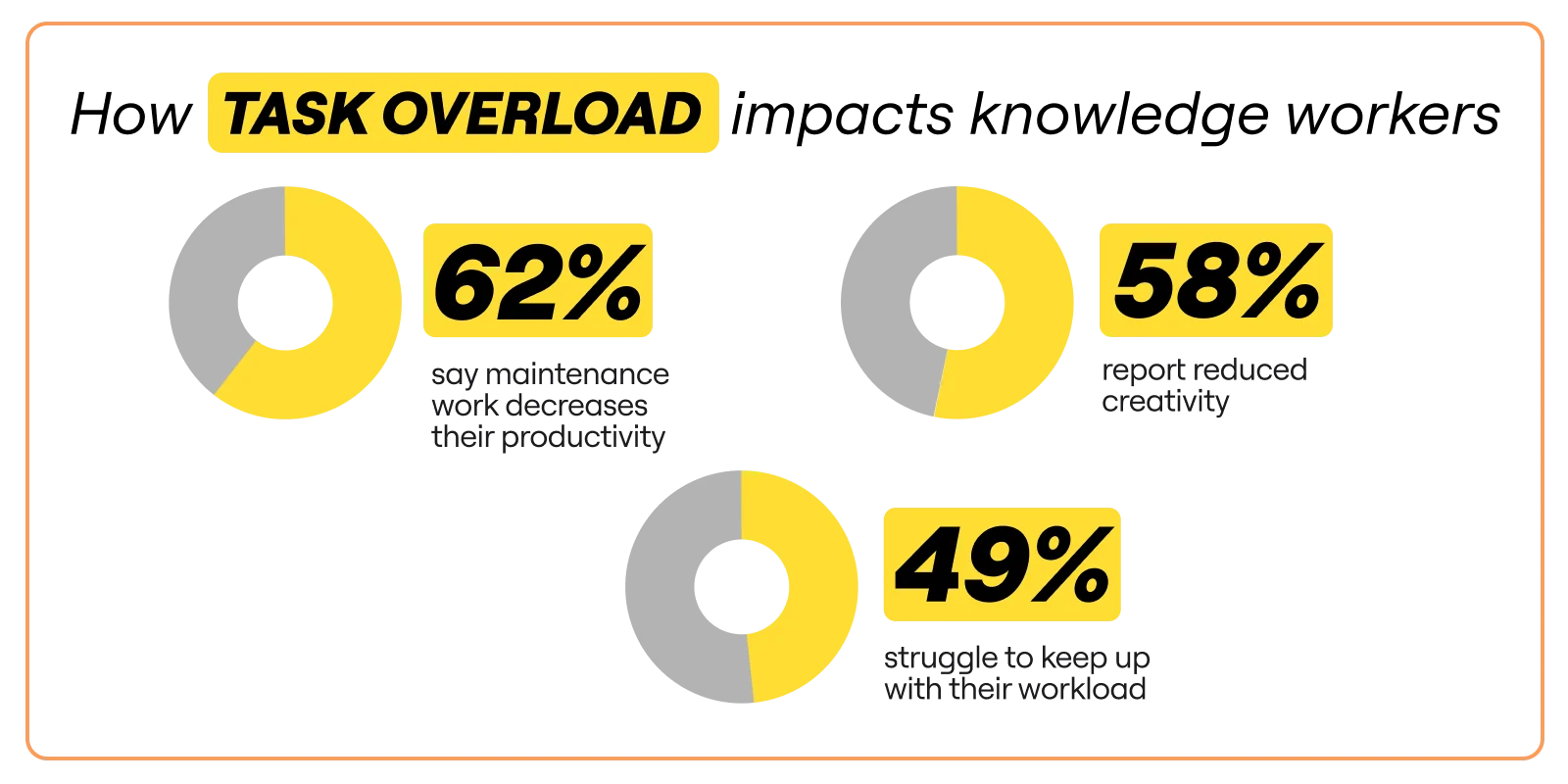
This widespread fallout from task overload cuts across company size, market, function, generation, and more. No one is exempt. Because people need time to think big, create, strategize, and collaborate — it's who we are.
Navigating the silo slowdown
Alongside sprawling maintenance tasks, silos exacerbate the challenges facing teams and organizations. Knowledge workers identify these three primary types of silos:
- Knowledge: Information and data are spread across too many tools (63%)
- Communication: Inconsistent tools, norms, or preferences across teams (57%)
- Collaboration: Breakdown when working cross-functionally (51%)
Fifty-nine percent agree that silos cause too much context switching, which leaves them tired, struggling to focus, and stressed.
Leadership misalignment is the top driver of silos, followed by outdated tooling.
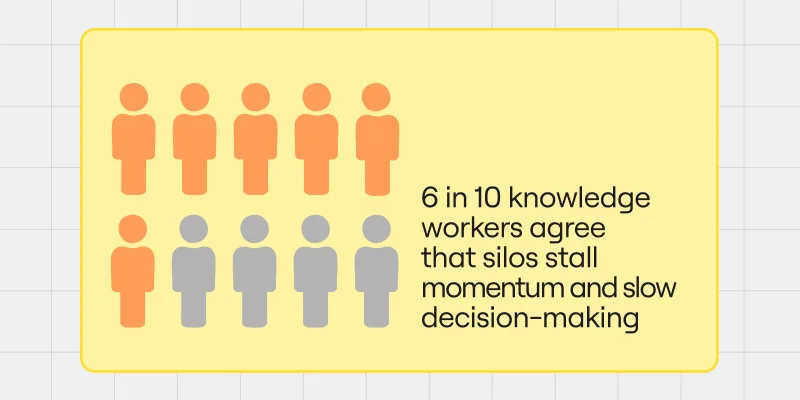
Silos and maintenance workloads shape how teams come together
Knowledge workers encounter a variety of obstacles related to silos and maintenance overload.
Sixty-nine percent experience collaboration struggles monthly or more, and nearly half (48%) face communication issues weekly.
In this climate, work becomes reactive instead of strategic: 80% of knowledge workers get pulled into urgent, last-minute projects (aka "fire drills") at least monthly and 29% experience this daily.
It’s no surprise that mental blocks are widespread: 70% experience that unwanted feeling of “being stuck” on a project at least monthly, and for one in five it’s a daily occurrence.
Here’s a breakdown of some common problem areas, by frequency:
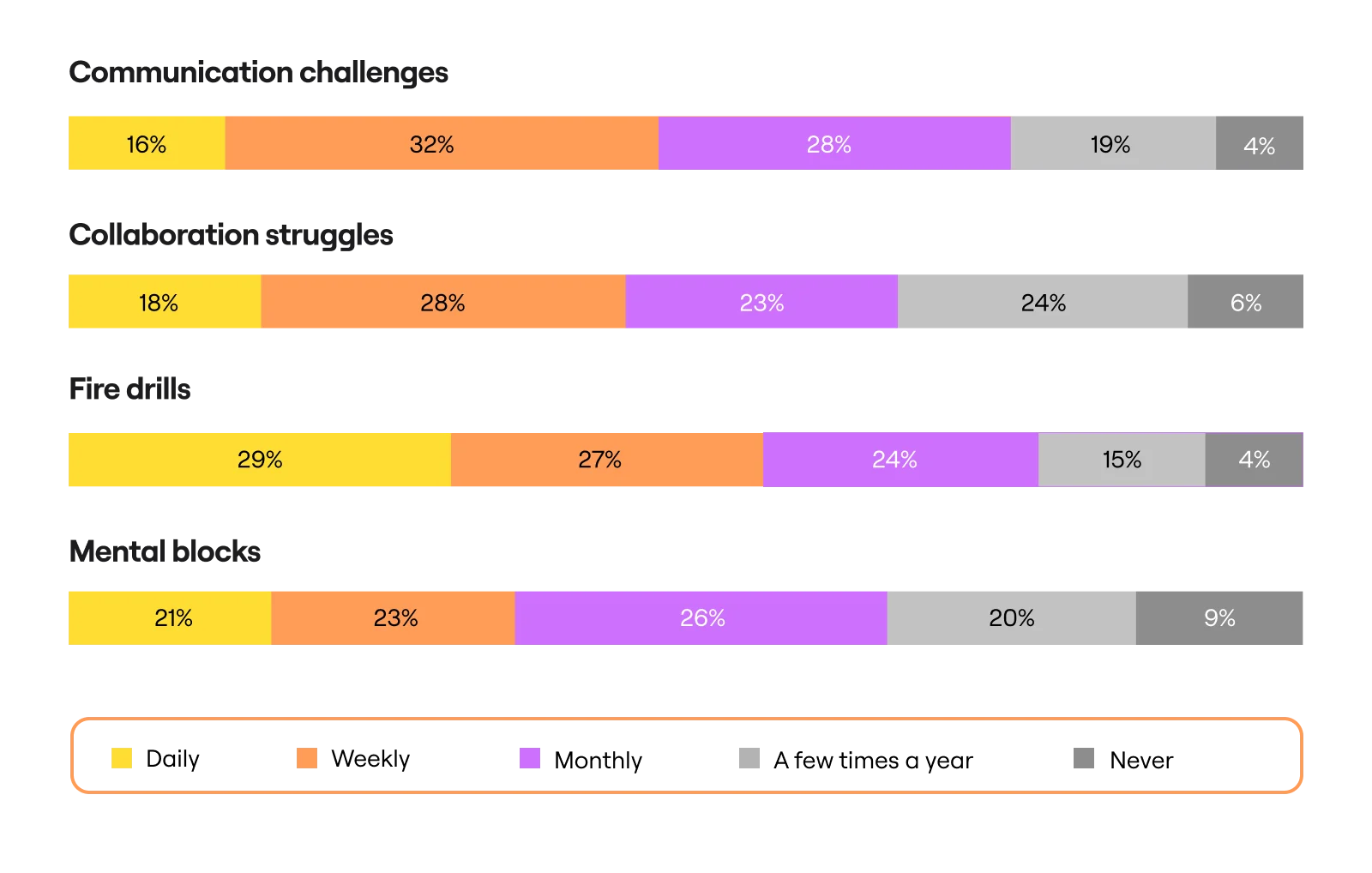
And it's not only about the work itself — it's about how teams feel. Nobody wants to feel like they can’t do their best work. For many, emotions run high, with half of knowledge workers saying they would leave a job if it were too siloed or the maintenance load were too great.
88% of workers experience emotional overload
Amidst daytime distractions, momentum work is now part of the second shift
When teams are bogged down by maintenance tasks and silos, they lose valuable collaboration time during the workday. To cope, knowledge workers are pushing the strategic, creative work, which benefits most from collaboration, outside of their normal working hours when they can actually focus. But is this really their best work?
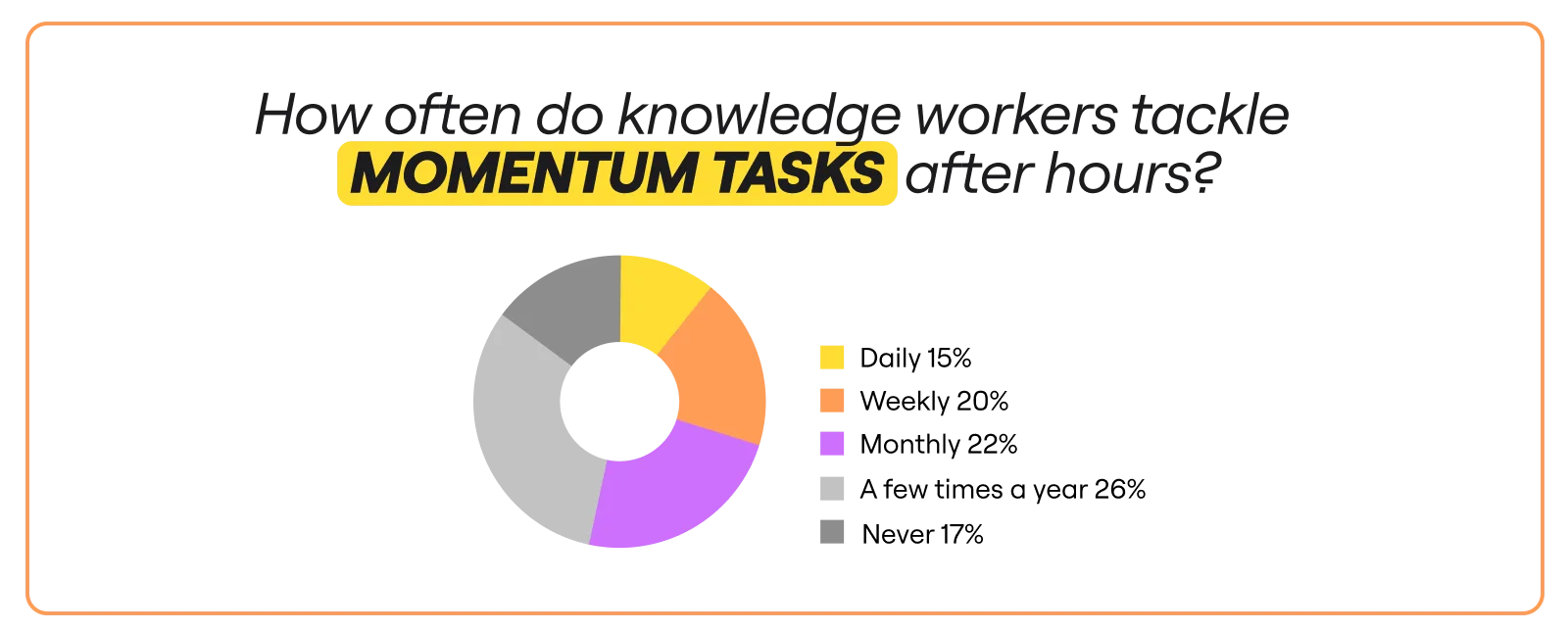
Today's teams crave the time and energy to focus, collaborate, and deliver
But here's the thing: teams want to be engaged and energized by their work. They thrive when working on the types of deep, thoughtful projects that bring people together.
According to three out of four knowledge workers, these are the top drivers of what makes a good day at work:
- Expertise with projects (76%)
- Amount of collaboration and level of interest in the work [tie] (74%)
- Overall productivity (73%)
- Proportion of strategic work and/or creative work [tie] (72%)
Knowledge workers believe that AI can create a better future of work
Knowledge workers feel optimistic about AI's potential to reduce maintenance work and erode silos.
A majority agree that AI can help with administrative tasks (55%) and reduce the need to redo work across tools (60%), in addition to reducing the task load with meeting prep (45%) and follow up (46%).
As for silos, they are hopeful that AI can streamline communication (54%) and information sharing (64%), and improve cross-functional collaboration overall (45%).
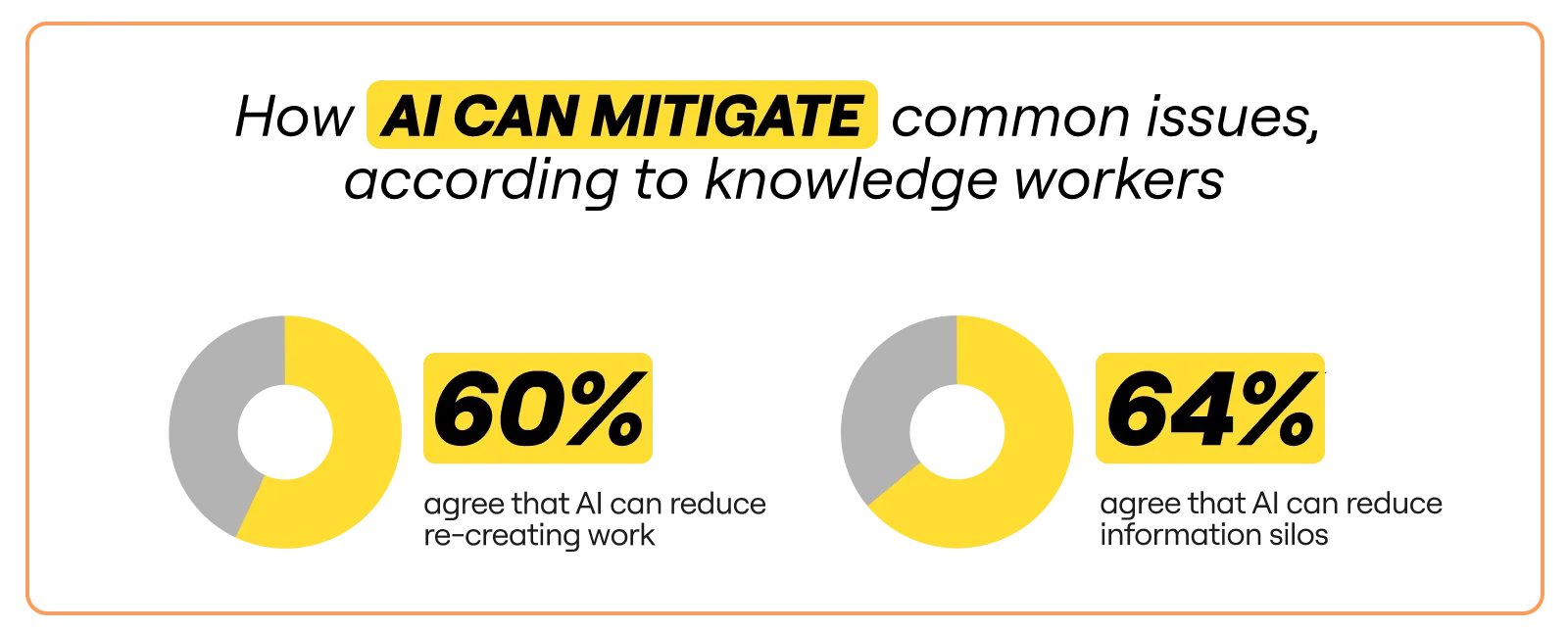
AI isn't a cure-all, but combined with team-centered ways of working it's a powerful antidote
Teams are siloed and overwhelmed by maintenance work. But it doesn't have to be this way. Offload rote tasks to AI. When it fits, turn to asynchronous work before scheduling meetings. Streamline communications to reduce endless noise. Translate goals and roles between teams. Collaborate across a canvas. Come together. Create. And build the next big thing — together.
Explore the key insights from this report and share them with your team:
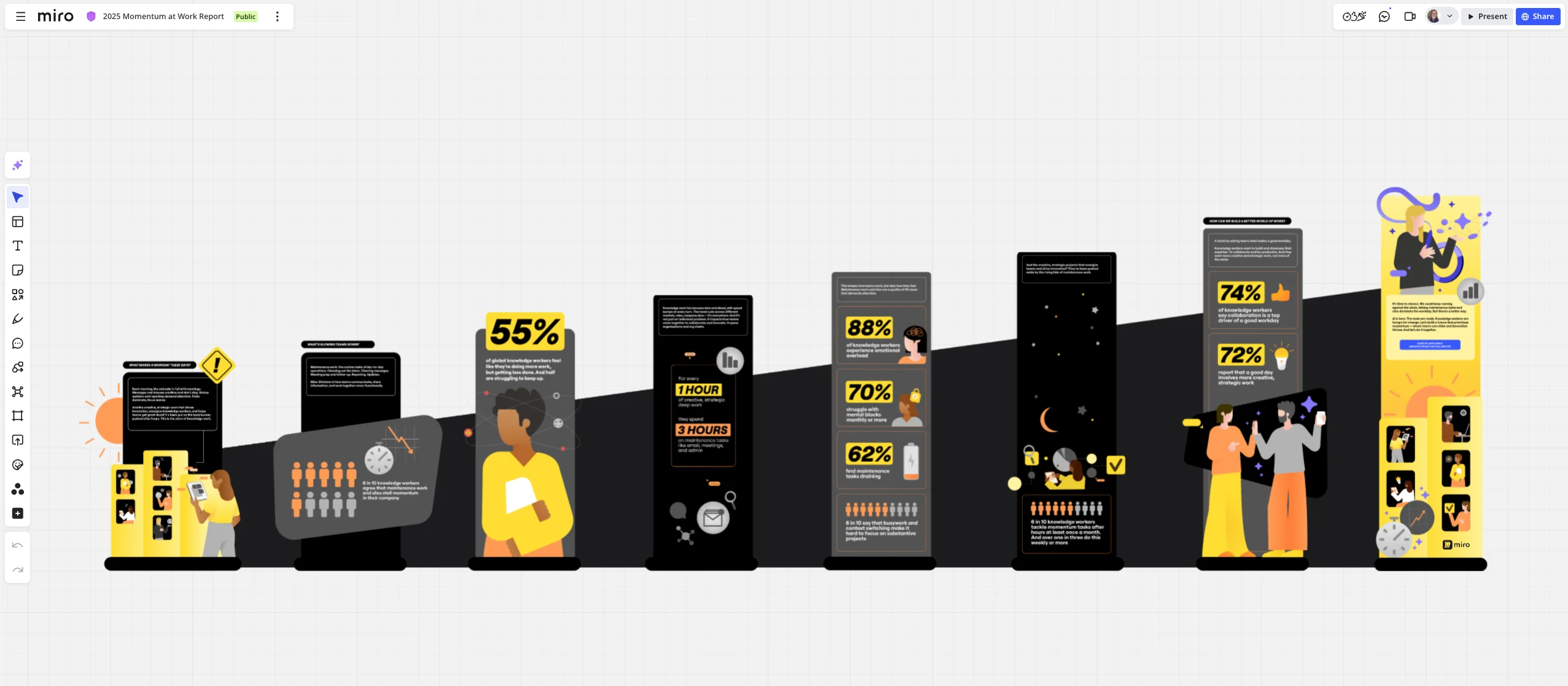
Methodology: In July 2025, Miro surveyed 6,148 knowledge workers in Australia, DACH, France, Japan, the Netherlands, Nordics, the UK, and the US. All respondents were full-time employees and represented a variety of roles, industries, and generations.